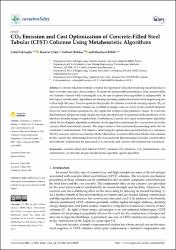CO2 emission and cost optimization of concrete-filled steel tubular (CFST) columns using metaheuristic algorithms
Citation
Çakıroğlu, C., Islam, K., Bekdaş, G., & Billah, M. (2021). CO2 Emission and Cost Optimization of Concrete-Filled Steel Tubular (CFST) Columns Using Metaheuristic Algorithms. Sustainability, 13(14), 8092.Abstract
Concrete-filled steel tubular columns have garnered wide interest among researchers due to their favorable structural characteristics. To attain the best possible performance from concrete-filled steel tubular columns while reducing the cost, the use of optimization algorithms is indispensable. In this regard, metaheuristic algorithms are finding increasing application in structural engineering due to their high efficiency. Various equations that predict the ultimate axial load-carrying capacity (N-u) of concrete-filled steel tubular columns are available in design codes as well as in the research literature. However, most of these equations are only applicable within certain parameter ranges. To overcome this limitation, the present study adopts a recently developed set of equations for the prediction of Nu that have broader ranges of applicability. Furthermore, a newly developed metaheuristic algorithm, called the social spider algorithm, is introduced and applied in optimizing the cross-section of circular concrete-filled steel tubular columns. The improvement of the structural dimensioning under the Nu constraint is demonstrated. The objective underlying the optimization presented here is to minimize the CO2 emission and cost associated with the fabrication of concrete-filled steel tubular stub columns. In this context, the relationships between the cross-sectional dimensioning of circular concrete-filled steel tubular columns and the associated CO2 emissions and cost are characterized and visualized.

















